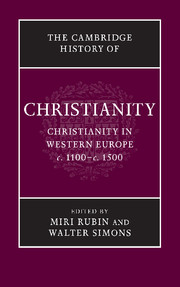Book contents
- Frontmatter
- Introduction
- PART I INSTITUTIONS AND CHANGE: 1100–1200
- PART II FORGING A CHRISTIAN WORLD, 1200–1300
- PART III THE ERECTION OF BOUNDARIES
- PART IV SHAPES OF A CHRISTIAN WORLD
- PART V CHRISTIAN LIFE IN MOVEMENT
- PART VI THE CHALLENGES TO A CHRISTIAN SOCIETY
- 23 Repression and power
- 24 Faith and the intellectuals I
- 25 Faith and the intellectuals II
- PART VII REFORM AND RENEWAL
- Select bibliography
- Index
- Map 1 Western Europe c. 1100 – c. 1500
- Map 2 Universities of Europe
- References
24 - Faith and the intellectuals I
from PART VI - THE CHALLENGES TO A CHRISTIAN SOCIETY
Published online by Cambridge University Press: 28 March 2010
- Frontmatter
- Introduction
- PART I INSTITUTIONS AND CHANGE: 1100–1200
- PART II FORGING A CHRISTIAN WORLD, 1200–1300
- PART III THE ERECTION OF BOUNDARIES
- PART IV SHAPES OF A CHRISTIAN WORLD
- PART V CHRISTIAN LIFE IN MOVEMENT
- PART VI THE CHALLENGES TO A CHRISTIAN SOCIETY
- 23 Repression and power
- 24 Faith and the intellectuals I
- 25 Faith and the intellectuals II
- PART VII REFORM AND RENEWAL
- Select bibliography
- Index
- Map 1 Western Europe c. 1100 – c. 1500
- Map 2 Universities of Europe
- References
Summary
The history of medieval thought could be written in terms of limitations demanded from reason to make room for faith. The church would be depicted as an inherently thought-curbing institute that constantly and efficiently exerted pressure on intellectuals for the defence of orthodoxy. The oppressed intellectuals exposed to threats of ecclesiastical or university condemnations could easily become the heroes of this story. But at the same time faith was subtly employed to make room for reason. From the twelfth century onwards, it became natural for scholars immersed in an academic environment (school or university) to employ reason to probe into subject areas that had not been explored before, as well as to discuss possibilities that had not previously been seriously entertained.
Surely, those who applied reason to the solution of problems in theology knew that, when it came to determining the answer, reason was subordinate to faith. Yet the very idea that questioning certain articles of faith could endanger one’s salvation, that vain curiosity (vana curiositas) particularly among theologians was undermining the academic vocation of theologians, created the need for due legal/judicial procedures that would limit or even abolish such dangerous dynamics and save faith (salvare fidem). The efficacy and the impact of ecclesiastical censorship apparatus (from simple verbal intimidations to condemnations, book burning and imprisonment) are still debated.
Keywords
- Type
- Chapter
- Information
- The Cambridge History of Christianity , pp. 372 - 393Publisher: Cambridge University PressPrint publication year: 2009

